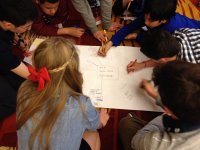In China, Students Come Face-to-Face with Global Issues
Your content has been saved!
Go to My Saved Content.More than 400 high school students from China and the United States gathered in the mega-city of Shanghai this month to tackle issues ranging from human rights to air quality to income inequality. Participating in the Global Student Leaders Summit developed by EF Educational Tours meant collaborating in real time with team members from different life experiences, language and cultural traditions, and world views. "We didn't come here for easy," said a student from Jackson, Mississippi.
Student innovators drew inspiration from a slate of expert speakers, including Jon Huntsman, Jr., former U.S. ambassador to China. But the hard work of generating socially responsible, sustainable solutions rested squarely on the shoulders of teens. For a generation that has grown up hearing about the importance of 21st-century skills, here was a chance to put their problem-solving strategies to the test.
Today, I'll highlight some global education themes that emerged at the summit. In my next post, I'll share reflections from some thoughtful students about what it means to be a well-prepared citizen in the new global economy.
Learning in a (Sometimes) Connected World
Even before students arrived for the Shanghai summit, they started getting acquainted by posting videos to introduce themselves and their passions. From a Chinese boy who wants to breathe cleaner air to a Utah girl determined to improve girls' access to education worldwide, the issues they care about are complex and globally intertwined.
Once they arrived in Shanghai, U.S. students who have grown up with ready access to technology found themselves cut off from familiar social media outlets. In China, there's no access to Google, Facebook, or Twitter. Government control of information was another eye-opener. "Chinese students told us that we may know more about their country than they do," said one American teen.
Language fluency mattered more than tech skills during the two-day summit, as students sat down for face-to-face conversations. In this respect, Chinese students had a distinct advantage. They attend English language classes outside their regular (long) school day because, as one student said, "we need an edge" in the competitive economy.
Huntsman, who is fluent in Mandarin Chinese, encouraged students not to leave the summit "without learning a little language. It's through language that you understand culture." Addressing globally interconnected issues like air quality and economic development "will take smart people who can talk to each other," he said. The former Utah governor emphasized people skills along with language fluency as key global competencies.
Choice and Change
Summit attendees said they imagine themselves becoming tomorrow's entrepreneurs, future teachers, or maybe even U.S. President. Aspiring journalists were well represented, too. They fielded a student media corps at the summit, posting stories and photos with media outlets back home and peppering Huntsman with questions during a student press conference.
Alex Blumberg and Adam Davidson, co-hosts of NPR's Planet Money, encouraged students to be nimble when it comes to career plans. "The basic rules of the economy are changing," said Davidson. "The safe career path is no longer so safe."
The radio hosts, in an interactive presentation that compressed 500 years of world economic history into less than an hour, told participants that their challenge will be to figure out "how you can add value" in the new economy. "You have absolute choice but no security," Davidson said. As manufacturing becomes increasingly automated, he added, "you don't want to compete with a robot." Instead, he suggested that students look to careers that will require capacities of creativity, insight, or emotional intelligence. "Do things that are very human."
Be Bold
Akanksha Hazari, founder of a social enterprise called m.Paani and winner of the million-dollar Hult Prize, urged students to be bold about their next steps as global citizens.
Hazari leverages her own brainpower to improve life for the world's poorest families --those living at the so-called bottom of the pyramid. Instead of depending on charity to do good work, she taps the power of markets. The m.Paani model, for example, connects the spending of low-wage families on mobile phones and other services to loyalty rewards that they can cash in to access education, healthcare, employment, or financial services. This project was one of several social enterprises featured at the summit to help students understand the value of sustainable solutions.
"Live an adventurous life," Hazari told summit attendees. She encouraged them to embrace the hashtag #yolo (you only live once), and assess the value of their life by asking, "What difference will you make?"
As a next step, Hazari encouraged students to go home and implement the social business solutions that bubbled up at the Global Student Leadership Summit. A portable water purification tank that runs on solar power won top honors from the judges. The popular vote went to a high-tech key chain that disrupts texting while driving by disabling mobile access while a car is running. Other project ideas aim at making college admissions less stressful, infusing education with creativity, eradicating bullying, promoting gender equality, and cleaning up rivers. Each idea incorporates a business plan that promotes sustainability. "Build them. Try them out," Hazari said.
Students who took part in the event now have the opportunity to earn $500 in seed funding from EF to implement community projects that promote social responsibility. They also are taking home an understanding of the design thinking process, which they used during the summit to generate solutions.
What lasting insights will students take away from this cross-cultural experience? In my next post, I'll share reflections from students who are thinking critically about the future they hope to create.
